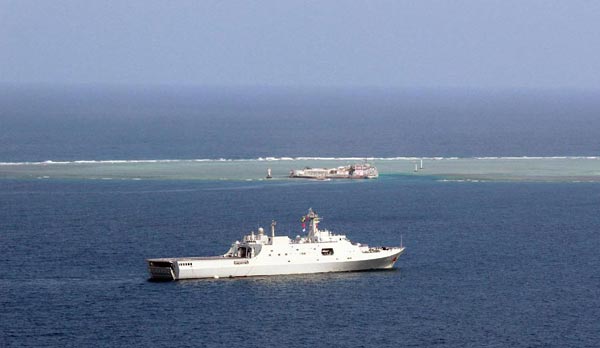 |
|
A formation of the Nanhai Fleet of China's Navy on Saturday finished a three-day patrol of the Nansha islands in the South China Sea. [Photo/Xinhua] |
Despite being of a scale similar to last year's, the ongoing "shoulder-to-shoulder" military exercises between the United States and the Philippines are more provocative because of the addition of an islands-seizing exercise.
Such military exercises are one of the ways in which the US is militarizing the South China Sea. The military drills organized by the US unilaterally or together with its allies in the South China Sea in recent years have increasingly presented a provocative posture because of their shortened distance to sensitive areas in the sea. The exercise in which Philippine troops recapture islands occupied by "foreign troops" also makes the joint drill more targeted.
The US has frequently sent warplanes and warships on patrol in the South China Sea as part of its attempts to militarize the waters. Under the excuse of "freedom of navigation", in October, the guided-missile destroyer USS Lassen made a muscle-flexing sail through the 12-nautical-mile waters around a Chinese isle where reconstruction work was being completed, one of more than 700 patrols the US navy has made in the South China Sea over the past year. Washington has also strengthened its military deployment in the area, such as by signing a series of pacts with the Philippines to allow its vessels to use Philippine ports.
The South China Sea issue can be traced back to territorial disputes and rows over maritime rights following the illegal occupation of some islands and reefs of China's Nansha Islands by some countries, such as the Philippines, since the 1970s. It is China's consistent stance that disputes should be resolved directly with the parties concerned, based on historical facts and in line with international law. China is also committed to working with Southeast Asian nations to maintain peace, stability and freedom of navigation in the waters.
Militarization of the South China Sea benefits no one. The US should keep its promise of not taking sides, instead of fueling dissension and tension in the region.

I’ve lived in China for quite a considerable time including my graduate school years, travelled and worked in a few cities and still choose my destination taking into consideration the density of smog or PM2.5 particulate matter in the region.
